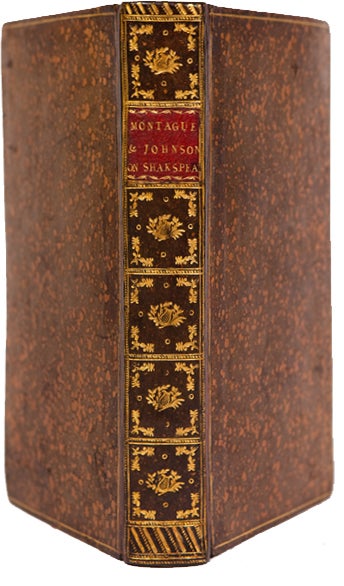
Mr. Johnson's Preface to his Edition of Shakespear's Plays. Bound with: An Essay on the Writings and Genius of Shakespear, compared with the Greek and French Dramatic Poets. With Some Remarks upon the Misrepresentations of Mons. de Voltaire. The Four
London: J. and R. Tonson, et al.; Edward and Charles Dilly, 1765; 1777. Octavo, contemporary full sprinkled calf gilt, rebacked, crimson spine label. Armorial bookplate of Sir Thomas Hesketh, private library label of Easton Neston. Light occasional foxing, first and last pages of Johnson's Preface embrowned. Item #100169
The scarce 1765 first separate edition of Samuel Johnson's preface to Shakespeare, bound with the 1777 fourth edition of Elizabeth Montagu's essay on Shakespeare. Both celebrated players on the London literary scene, Dr. Johnson and Mrs. Montagu bring their individual strengths to the task of identifying what makes Shakespeare great. Johnson's preface remains one of the most forceful and original defenses of Shakespeare, countering those critics (notably Voltaire) who dismissed Shakespeare's plays as formless and vulgar: "The work of a correct and regular writer is a garden accurately formed and diligently planted, varied with shades, and scented with flowers; the composition of Shakespeare is a forest, in which oaks extend their branches, and pines tower in the air, interspersed sometimes with weeds and brambles, and sometimes giving shelter to myrtles and to roses; filling the eye with awful pomp, and gratifying the mind with endless diversity." Johnson's elevation of the comedies may surprise the modern reader, but his insight that Shakespeare's "tragedy seems to be skill, his comedy to be instinct" remains striking, as does his observation that "Shakespeare has no heroes; his scenes are occupied only by men." His bibliographers Chapman and Hazen point out that "the separate Preface appears to be scarce. It is possible that the publishers were reluctant to let people read Johnson's preface without paying for his edition [of Shakespeare's works] . . . and while unable in decency to resist the public demand -- or the author's request -- protected themselves by printing a small edition" (148). Prominent bluestocking Elizabeth Montagu, whose bestselling essay first appeared in 1769, sets her sights directly on Voltaire, pointing out the ludicrous aspects of the mannered French tragedies he prefers, and culminating in a close reading of Julius Caesar that reveals basic errors in his translation. While Montagu's essay is less memorable as literary criticism, her attack on Voltaire's prejudices and her defense of Shakespeare as "one of the greatest moral Philosophers that ever lived" created a sensation in England and abroad. A unique volume, bringing together two classic works of eighteenth-century Shakespeare criticism, very handsomely bound.
Price: $3,000.00
